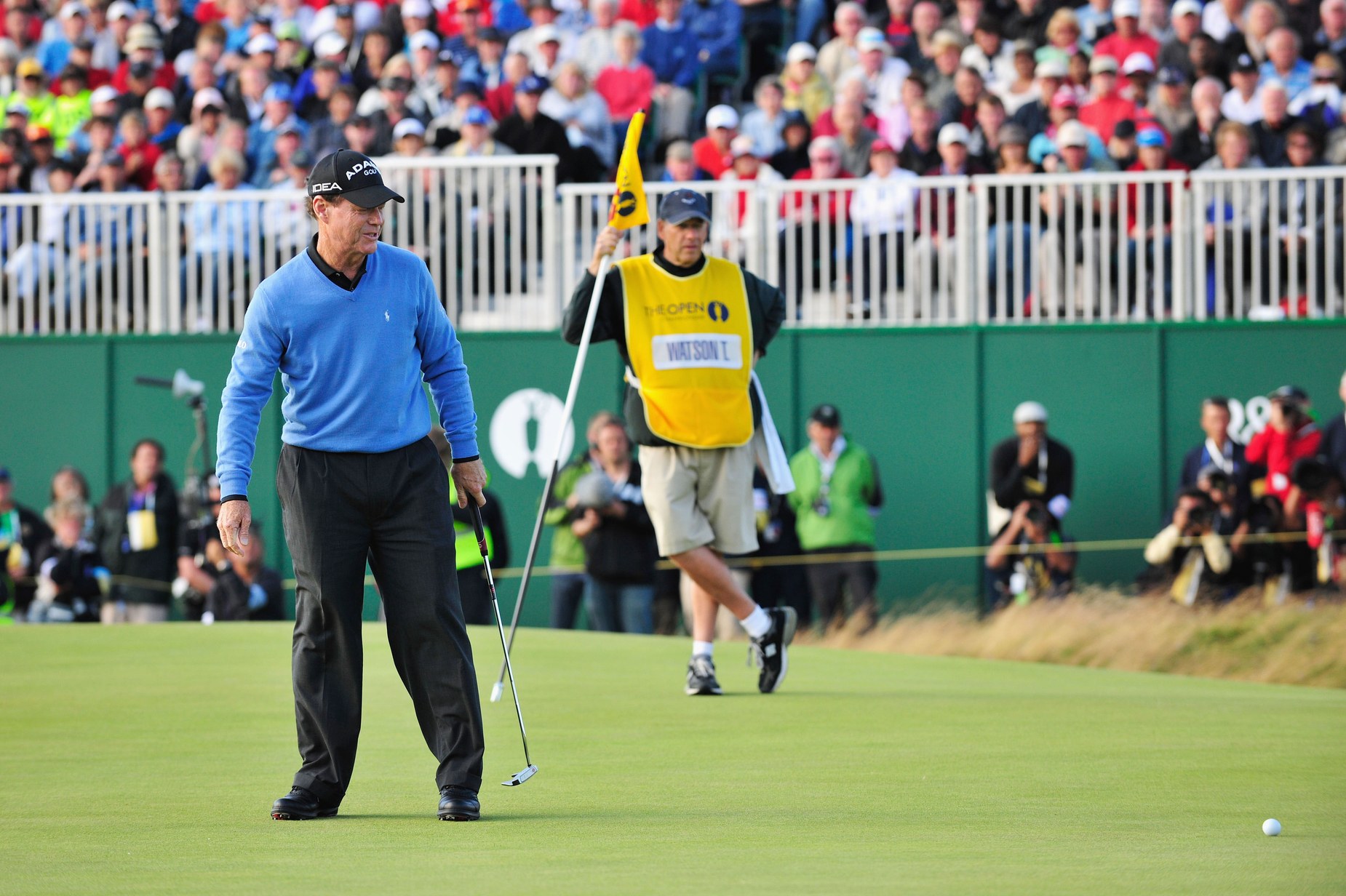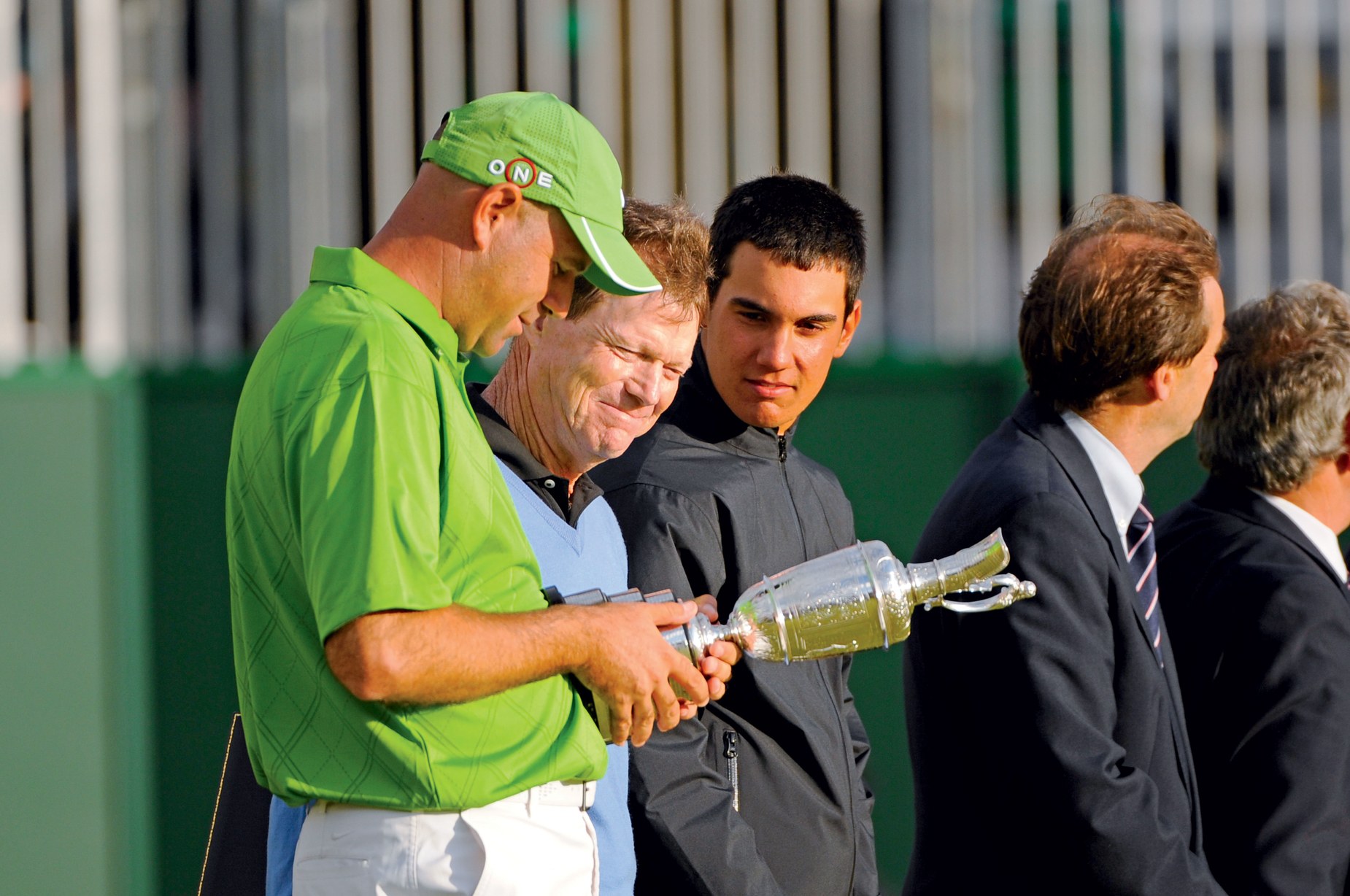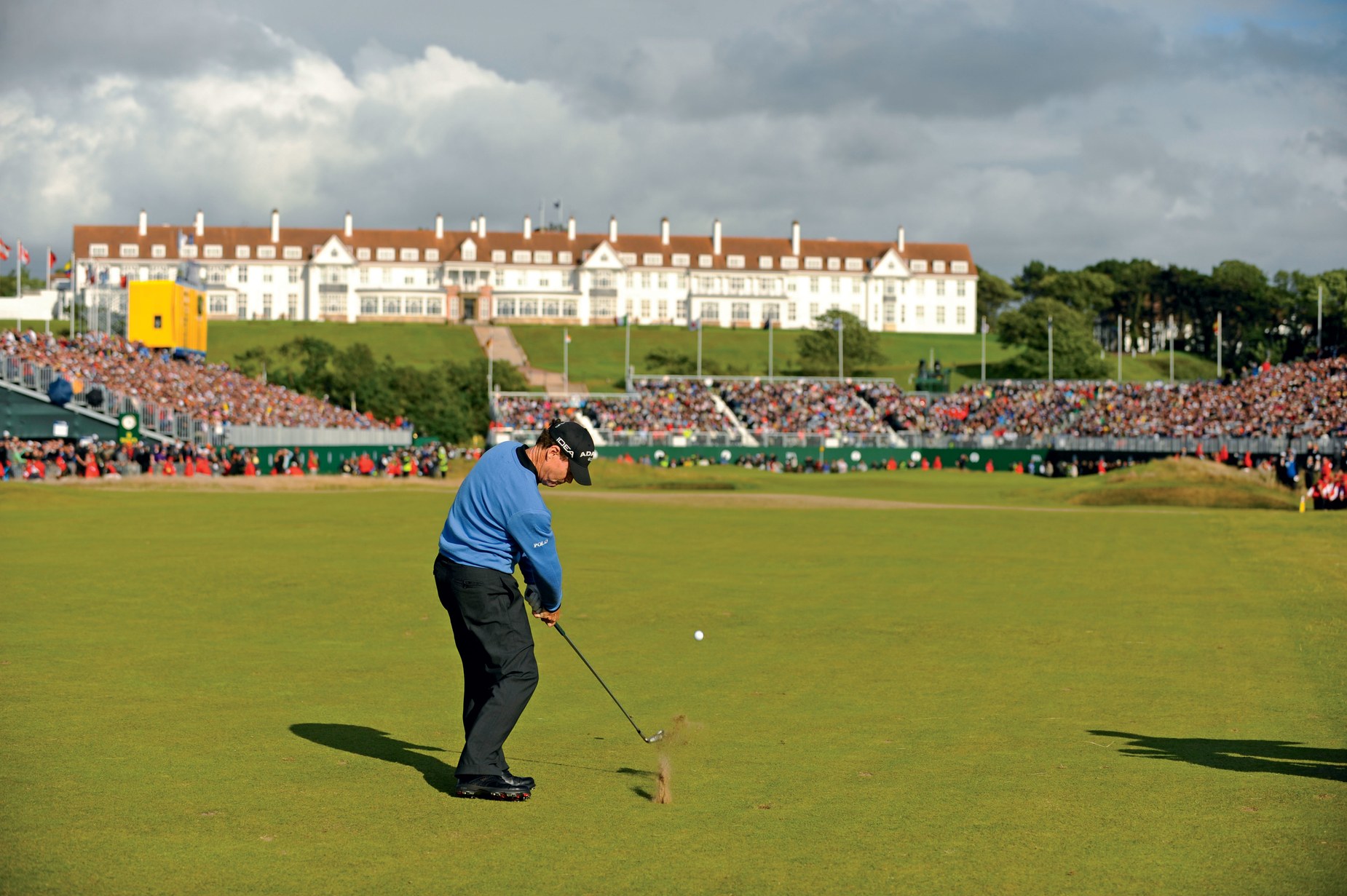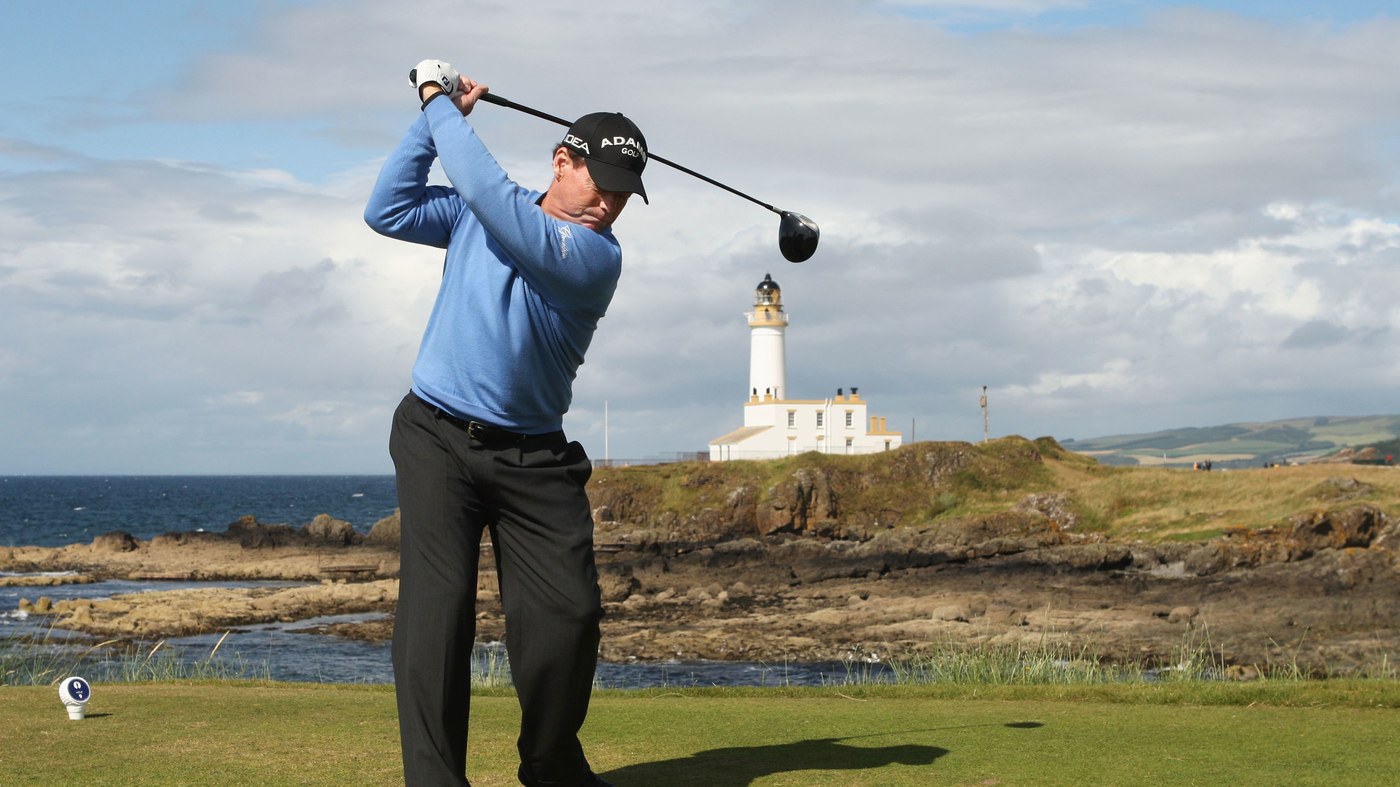Shortly after just missing out on a sixth Open Championship title in 2009, at age 59, Watson offered some lessons you can take from his experience
By Bob Verdi
Editors’ note: Tom Watson’s recollections of his near-miss at the 2009 Open Championship at Turnberry first appeared in the October 2009 issue of Golf Digest, shortly after he lost in a playoff to Stewart Cink and his bid, at 59, to be a six-time Open champion and the oldest winner of a major came to an end.
• • •
WHAT I TOOK AWAY from the British Open at Turnberry, among a lot of different emotions, is a real hurt that I did not finish the job. That’s the bottom line in any game you play. I hit two good shots on the 72nd hole, and it didn’t work out. That can happen in links golf. What I took away between the British and U.S. Senior Opens is bad plumbing. I had a meal over there, and my caddie, Neil Oxman, had warned me: Don’t eat Chinese or pizza in the United Kingdom. I went Chinese.
NEIL WAS WORKING for Labron Harris Jr. when he introduced me to Bruce [Edwards, Watson’s longtime caddie who died of ALS in 2004] in St. Louis in 1973. Neil pointed Bruce my way, and we formed a long-lasting relationship. Bruce was looking down on Turnberry. I know that. That was part of the spiritual experience over there: Let’s give it one more ride, Tom. One more ride they won’t forget, boss, before you head off into the sunset.
SERGIO GARCIA was in our threesome on Thursday and Friday. In the second round, after a first round when there was no wind, I knew going out on the front nine would be difficult. I didn’t handle it real well. Sergio came over and said, “C’mon, old man”—in a nice way—right when I was struggling. That helped get me going.
EVEN WITH THE LEAD Saturday, I wasn’t jumping out of my skin. I kept my tee ball in play, which you have to do over there. I’m not as good off tight lies as I used to be. I hit it thinner sometimes now. But my go-to punch was my tee ball, and I felt confident about that during practice rounds. I’ve always been a good wind player. You don’t lose that. You lose other things maybe, not that.
I REMEMBERED what Greg Norman had done the year before, when he led the British Open by a stroke at the turn Sunday [at age 53]. I was telecasting for ABC. I said there was no reason he couldn’t do well. I was supposed to do the same TV job at Turnberry on the weekend but was otherwise occupied. When you’re in the last group, there’s not a lot of chance to be in the booth.
I SLEPT FINE Saturday night, before the final round. My game plan was to make one more birdie than bogey over the last 18 holes. I thought that would have done the job, and it would have, but I didn’t pull it off. I made two more bogeys than birdies. I was nervous on Sunday, but nothing out of the ordinary. It was a good nervous. Saturday was the day that was interesting. As gentle a round as I’ve ever played in a major, as far as what I felt inside. I made a joke after the round that my nerves were fried, but that’s just what it was, a joke.
I’VE HEARD that on Sunday, Mathew Goggin was clapping for me as we came to the 72nd green in the last twosome. Then, apparently, Stewart Cink did the same on No. 18 in the playoff. Didn’t see it. Just heard about it. That just tells you, it’s all about the game, not me. Our sport is unique in that way, the conduct of our players and the respect for the game. Jack Nicklaus has always had the reputation of being a great loser—in the good sense. If you get beat, you tip your hat to the guy who beat you, just as he did with me in 1977 at Turnberry. If you can’t do that, there’s something wrong with you. A lot of sports are dog-eat-dog, but golf is different. This is our job—we try to whip the other guy—but it’s different.

Richard Heathcote/Getty Images
Watson just misses his par putt for victory on the 18th green at Turnberry.
PEOPLE SAID I was smiling a lot, maybe more than any other player. How could you not, with the reception I was getting at every green?
ONE DO-OVER? I’d probably hit the 8-iron easier to the 72nd. I had 170 yards to the front, 164 to the right front, where you didn’t want to go because the green runs out to the right. So I hit it at the flag. Didn’t really see it because I can’t see anymore, but Andy North [ABC commentator] said it hit one foot on the green. You’d think I could stop it, but that crest was probably the driest part of the green.
FROM THE COLLAR behind the 18th hole on Sunday, I went with the theory that your worst putt is better than your worst chip—even with the success I’ve had chipping. The ball was sitting down; I could have stubbed a sand wedge and left it short. It was uphill and into the wind; the grain was against me. Problem is, the ball started bouncing. It came out of that lie bouncing, and hot.
MOST DISAPPOINTING was the putt to win in regulation. During Monday’s practice round, I made a slight adjustment in my putting stroke. I wanted to make sure I went more square to square. For the most part, I kept that thought throughout the week, and that’s what I was trying to think on the eight-footer on Sunday: Square to square; do what you’ve been doing; think what you’ve been thinking. But I took the club a little inside and never did get it in position. I blocked it with my left hand. Never released. Went right. Awful. I said I didn’t want to see a replay, but maybe I should, so I don’t do that again next time. Awful.
I GUESS HILARY [Watson’s wife] had her eyes closed on that last putt of regulation. She couldn’t bear to watch. Just as well. Maybe I should have used a designated putter. When it was all over, Hilary gave me a hug and said, “You did what you could do.” But I might never have another chance to beat the kids again.
WHEN YOU’RE PLAYING in the wind, you always have two clubs in mind before a shot. At least I do, and I did consider a 9-iron on the approach to the 72nd hole. The pin was about 20 yards back; it was between a 9 and an 8. I wound up using 8-iron, and I don’t second-guess myself there. I don’t know what would have happened had I hit 9-iron, but I don’t feel like it was a mistake.
NEITHER DID JACK. He called after I went to dinner Sunday night and said some nice things. He said, “You hit two perfect shots on the 72nd hole and made the right decision to putt the ball from the back of the green.” That took a little of the hurt out of what I was feeling, hearing from Jack. Jack said he watched the entire Sunday round on TV, something he would never do. Pretty cool. Most of the week, I’d been going back and forth with Barbara, texting on the cell phone. She made a point to let me know that she and Jack were pulling for me, telling me I looked great and all that. Which was also nice.
‘It’s the outcome that matters, not whether you hung in there at 59 and put on a good show.’
JACK AND BARBARA were there in 1994, after I’d lost [Watson was one off the lead entering the final round but shot a closing 74 to finish T-11]. We went to the little pitch-and-putt course right in front of the Turnberry Hotel. We played until we couldn’t see much anymore, just us and our wives, having a good time. We didn’t keep score or anything, and there were no winners or losers. Just having a good time.
AS MUCH AS IT HURT ME to lose this year, I could also feel how people there felt. It would have been a great story for you guys. When I came into the press tent after and saw all those long faces, that’s why I said, “This ain’t a funeral.”
THE THRILL of competing is tremendous, and the vibes I felt from those people and my peers during the week at Turnberry will never go away. After all, you lose in this game more often than you win. A lot more often. I’ve always been able to take defeat or disappointment and make lemonade out of it. Like Bobby Jones said, “You never learn in victory. You only learn in defeat.” It was a magical week, maybe my last chance to do something, and those feelings of warmth took a little of the sting out of it. I was humbled. Totally humbled.
BUT IT’S THE OUTCOME that matters, not whether you hung in there at 59 and put on a good show and almost made for a hell of a story. Some of the writers were kind, saying it was a great story anyway. I say, almost. I had it within my grasp, I was in a good frame of mind, I wasn’t nervous, but I let it slip away, and then in the playoff, I just didn’t put up much of a fight. More bad swings in four holes than in four days? Sure looked that way. Only one guy finished. I felt a great sense of serenity during the week. And deep, deep disappointment after.
WE WENT to Wildings that night. Hilary, me and a couple friends. Great restaurant; went there five times that week. Walked in, and everybody stood up. Pretty cool. Nice dinner, then after, I signed some stuff and took pictures. One—with some really nice-looking young girls—wound up on the front page of one of those tabs.

J.D. Cuban
After his playoff victory, Cink looks at the claret jug with Watson and low amateur Matteo Manassero.
ON THE PLANE TO LONDON the next day, another nice ovation. The night between was tough, though. You’re not human if you don’t play “What if?” You tend to look at failures instead of good bounces, the eight-footer you miss instead of the 60-footers you make.
HOW SO MANY people got my e-mail address, I don’t know. People I’ve contacted maybe once in my life. I heard from friends, of course: Sandy Tatum, Rush Limbaugh, Barbara and Jack. But hundreds from so many others I don’t really stay in touch with.
MICHAEL, MY SON, was morose. He’s 26, in commercial real estate back in Kansas City. I called him the Monday after, and he cried. I let the conversation end. Ten minutes later, I called him again and went over with him what it really meant. It’s only a game. I’ve cried before, but not then. I got messages from guys in Iraq I met two years ago on a USO Tour. I was affected by that, and still am. I’ve since played with men who didn’t have a left arm or a right arm. Or they left their legs over there. What they’re doing, that’s pressure. That’s not a game. Not an eight-footer.
THING IS, I MADE a lot of putts at Turnberry. Not just the no-brainers, but six- and 10-footers. If I had played the way I played from tee to green and made nothing, well, it would have been like 1994. Nick Price won that year at Turnberry, and that was more disappointing than this year, when I missed one chance to win on the 72nd hole. In 1994, I had a dozen opportunities. I putted terribly.
LINKS ARE GREAT EQUALISERS. If you’re not playing well, you’ll hit it in the hay. So I don’t agree that a 59-year-old guy almost winning reflects badly on the younger generation. The notion that they can’t finish, well, Stewart Cink finished. He drilled me in the playoff. And I feel bad he didn’t receive the adulation he deserved. Good man, faith, family. Did it the right way. After it was over, I told Stewart, “You wear this well … enjoy it.” Those of us inside the curtain know what it takes.
IT’S NOT OUT OF THE REALM of possibility that equipment had something to do with how well I did at Turnberry. The ball flies straighter than ever, and it goes farther. Obviously, straight is good on the links. On Sunday, after a birdie at No. 11, I hit my tee ball off line left on No. 12, but I caught a break when the ball hit a spectator and dropped in a perfect lie. I hit a 4-iron onto the green. I think I knocked it into only a couple fairway bunkers all week. I also used my hybrid 25 times in four days there. My Adams 18-degree. That was my sword. That’s about equipment, too. Not to say I couldn’t have done what I did with a 2-iron, but 2-irons are harder to hit than hybrids. Technology.
One do-over? I’d probably hit the 8-iron easier to the 72nd.
EQUIPMENT DOESN’T HELP me at Augusta National, which is why I said I’m a ceremonial golfer there and too hardheaded not to play at all. I can’t play No. 5 very well in the Masters, or No. 14 or No. 17. I just can’t go in there with a short-enough iron to hold those greens. At Turnberry, you can run some balls up on the greens, but you can’t really do that at Augusta. But they did what they did there for a reason, even though some guys who’ve won there recently aren’t bombers, like Mike Weir and Zach Johnson. Turnberry hasn’t changed my mind about my chances at Augusta, though.
I SAID SUNDAY NIGHT that I hope to be remembered as a hell of a golfer by my peers. I also hope people remember me for doing what I did the right way. I’ve made mistakes. We all do. But I’ve tried to live my life the right way.
I WAS ASKED about Tiger and how he played, and why he missed the cut. Well, I don’t know how he played because I never saw him play. If you’re off, if you’re not playing well on the links, you’re in trouble, no matter who you are. If you’re the No. 1 player in the world and you aren’t swinging the club the way you want to, your ball is going to wind up in some bad places. Which is where I wound up on No. 17, the third playoff hole. I was disappointed, yes, after not winning in regulation, but it’s not like I wasn’t ready for more. On that hole, though, I tried to hold the ball up in the crosswind off the tee and basically lost control of the club. I hooked it, big time, into the hay, and that killed me. Pull-hooked it into the hay, and it was pretty much over.
HOW CAN SOMEONE who doesn’t dominate on the Champions Tour go over there against the kids and almost win a British Open at age 59? I don’t know. Stealth and treachery? What can I say? There are horses for courses, and I had a good feel for Turnberry the minute I got there.
WHETHER PART OF THE REASON I can compete on occasions such as Turnberry is because I’m in decent shape, well, I come from good genes. I’ve also stopped smoking cigars. I was smoking too many, not on the course, but maybe eight or 10 of those little ones every day on the farm. Didn’t inhale, but my grandfather died of throat cancer.

J.D. Cuban
Watson’s one do-over from the round: hitting this 8-iron a little easier on the 72nd hole.
IN 1982, WHEN I WON the U.S. Open at Pebble Beach, I was probably 175 pounds. Now, I’m 180. I had a left-hip replacement last October, and that’s worked out well. Right after you have one of those, they have you up and moving around. I don’t know that it’s helped so much with my golf game. I did it for quality of life. I had trouble sleeping because of the pain. No more.
I DON’T DRINK ALCOHOL anymore. I quit cold turkey, four or five years ago. Like cigars, I was doing too much of it, and I didn’t like myself when I was drinking. We’ve all been around people who drink too much, and they’re not pleasant to be around. Friends told me I was one of those people. I don’t remember my kids saying anything. But friends told me, and that’s what friends are for. Amazing when you’re sober how things look different. I don’t miss it, not at all.
MY SWING might look the same as it always has, but it really isn’t. I don’t have the extension I once had. The width of my arc is not what it used to be. My left arm bends a little bit now. I learned how to swing the golf club for real in 1994. I had some success before then, but in 1994, that’s when I found the key. Like Sam Snead said, we all have our keys. If one key stops working, you go to the next key. I found the key at 3:15 during practice on a Tuesday afternoon at the Heritage Classic, 1994, Hilton Head, South Carolina. That’s when I found the secret. My attack into the ball. I didn’t win that week, but I knew I had found it. I was tired of hitting the ball with toe-deep divots out to the right. I decided to swing like Corey Pavin’s practice swing. Swing to the left through impact.
AS SOON AS I DID THAT, I hit the ball perfect. Divots were square, and I had a different feeling with my right shoulder. It wasn’t as low coming into the ball. It all had to do with shoulder plane, keeping it the same on the downswing as it was on the backswing. I had always practiced my backswing. Then, out of frustration, I found something that worked.
I RAN INTO PETER DAWSON [the then R&A chief] on Saturday night at Turnberry. During the week, in press conferences, when I was asked about the age restriction at the British Open [champions are no longer exempt after 60], I hinted that it’s up to you folks in the media to get the message across to Peter. When I saw him, he told me, “Tom, you could make this whole point moot by winning tomorrow.” Then, even at age 60, I would have had a 10-year exemption. He was right, and I agree with what they do. The age limit is correct, because they have to make room for younger players.
Editors’ Note: In November 2009, the R&A changed its qualification rules to allow any Open champion to finish in the top 10 or ties to be exempt into the next five Opens, regardless of age. That allowed Watson to be exempt through the 2014 Open.
MICHAEL IS TELLING ME that after Turnberry, I should go back and play against the kids. The regular tour, not the Champions Tour. I told him to let it slide. Don’t get carried away, son. He’s going to caddie for me next year at St. Andrews. He missed Turnberry, but he’ll be there in 2010, and St. Andrews will be my last British Open, unless … you never know. We’ll need a little wind. There’s no law against me trying to do something crazy again, is there?









